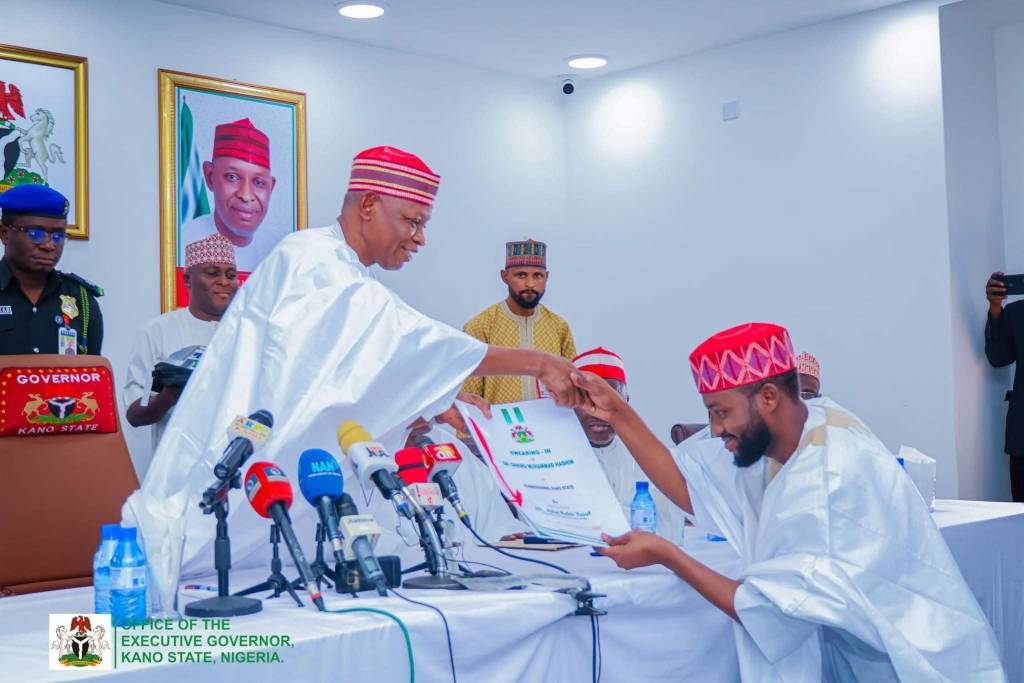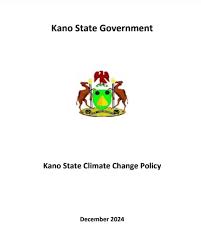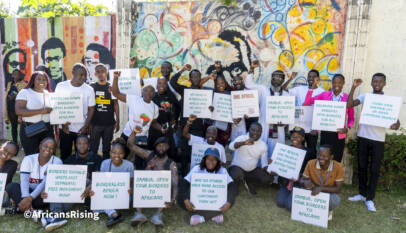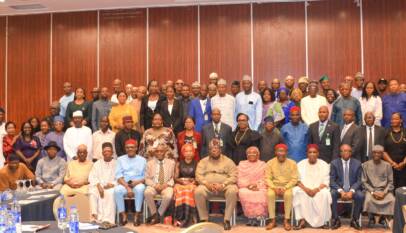Kano Climate Change Policy and Nigeria’s Quest for a Greener Future
The Kano State Climate Change Policy, which aligns the state’s development goals with both national climate strategies and international commitments, represents a significant shift from short-term, reactive approaches to long-term, locally driven solutions.

Nigeria adopted the National Climate Change Policy and Response Strategy (NCCPRS) in 2012, and since then, climate action has advanced significantly in the country. By ratifying the 2015 Paris Agreement, Nigeria reaffirmed its commitment to a low-carbon and climate-resilient future. It represents a significant shift from short-term, reactive approaches to long-term, locally driven solutions that embed climate considerations into planning and governance.
The Kano State Climate Change Policy, one of few such policies by subnational governments in Nigeria, is designed to steer the northwestern Nigerian state toward environmental sustainability and resilience. Spearheaded by the Kano State Ministry of Environment and Climate Change, the policy aligns Kano’s development ambitions with national and global climate targets, marking a strategic shift from reactive measures to long-term, locally grounded solutions.
With rising desertification, erratic rainfall, and growing urban pressure, Kano’s vulnerability to climate risks is worsening. Thus, the new climate policy sets out to address this with a people-centered, evidence-based approach. It targets emissions reduction, resilience in farming and energy, and the mobilization of climate finance, all while ensuring that citizens and civil society are active players in shaping a greener, more sustainable Kano.
In his foreward to the Policy, Kano State Governor Abba Yusuf described climate change as one of the most pressing challenges of our time, with far-reaching environmental, social, and economic consequences. Governor Yusuf said addressing climate impacts requires a comprehensive, multi-sectoral approach integrating mitigation and adaptation strategies within a dynamic policy framework, underlining Kano’s commitment to proactive climate action to safeguard sustainable development and build resilience across all sectors.
Governor Yusuf says the Policy provides “a strategic roadmap for climate action, outlining sectoral and cross-sectoral policy measures to guide the state’s response. It is the result of an inclusive and participatory process involving government institutions, private sector actors, development partners, civil society organisations, and local communities. This collaborative approach ensures that the policy reflects the realities on the ground while integrating both immediate and long-term adaptation and mitigation strategies.”
The Kano Governor noted that the Policy’s successful implementation requires strong institutional coordination, sustained commitment, and financial and technical support from all stakeholders, including the private sector and multilateral development partners. He reiterated Kano’s desire to enhance resilience, reduce vulnerabilities, and contribute to national and global climate goals under the United Nations Framework Convention on Climate Change (UNFCCC).
The climate policy and its implementation roadmap embed climate strategies into the state’s budgeting and institutional frameworks, aiming to catalyze cross-sectoral reforms with the active participation and buy-in of various state ministries. The policy’s formulation process enjoyed multistakeholder support, including the Foreign Commonwealth and Development Office’s (FCDO) Partnership to Engage, Reform, Learn (PERL), Propcom+, the Partnership for Agile Governance and Climate Engagement (PACE), and the United Nations Children’s Fund (UNICEF).
Kano’s Climate Policy: A Blueprint for Local Climate Action
Through its climate policy, Kano State has made a major stride in combating climate change. The policy aligns the state with global climate goals while providing locally tailored solutions and strengthening Kano’s contribution to Nigeria’s Nationally Determined Contributions (NDCs) under international climate agreements. If effectively implemented, the policy holds the potential to transform not only the state’s physical environment but also improve health outcomes and enhance resilience across its communities.
Dr. Dahiru Hashim, Kano State Commissioner of Environment and Climate Change, says the climate policy integrates key sectors such as health, transport, commerce, and education and aims to create a community-driven and inclusive system, enabling both government and citizens to work together in addressing climate change. Stakeholder engagement was central to the policy’s development, ensuring its long-term sustainability and relevance.
“I believe this policy will help us establish an enabling environment for sustainable development. Our people face challenges like desertification, rising temperatures, and poor air quality, and this document helps us respond strategically. As a trained medical doctor, I can confirm that many of the diseases we see, such as respiratory illnesses, temperature-related outbreaks, are caused by environmental issues. Flooding and droughts also lead to post-traumatic stress, lost of livelihoods, and public health crises,” said Dr Hashim.
The Commissioner highlighted that the policy serves as a foundation for institutional reform. In addition to the climate policy, Kano State is updating its environmental bylaws and crafting a roadmap to enhance resilience against desertification, deforestation, and rising temperatures. This multi-sectoral strategy is designed to strengthen climate governance and serve as a model for other states in northern Nigeria.
“While climate change is a global issue, it needs local solutions, and this policy guides how we in Kano contribute to national and global efforts. Our climate policy integrates the work of eight ministries including transportation, health, commerce, and more. We believe climate action must be community-based and community-driven. We want to make sure whatever initiative we start is sustained over time,” the Commissioner noted.
Kano’s Transport Policy Aligning with Green Mobility
With a growing urban population and rising vehicular emissions, the Kano State Ministry of Transportation is taking strategic steps to align the state’s Transport Policy with its climate policy. The goal is to integrate environmental sustainability into urban planning in one of Africa’s largest and fastest-growing metropolises. Dr. Nura Hassan, Technical Advisor on Transport Policy and Planning, emphasized that climate-smart transport solutions are essential to achieving a cleaner, greener, and more resilient Kano.
“From adopting clean energy vehicles to building emission-reducing infrastructure, the Ministry’s plans reflect the broader climate goals set by the state. This sectoral alignment ensures the policy is not just a document but a working tool for real change. We are looking at high-capacity buses that are more efficient and less polluting, alongside infrastructure that supports clean transport. For example, we are introducing Compressed Natural Gas (CNG) vehicles and high-capacity buses on major corridors. E-vehicles are also part of our future plans,” he stated.
Dr. Hassan emphasized that a clear implementation framework is crucial. “The strategy must involve cross-ministerial collaboration. The Ministry of Environment cannot do this alone. Success depends on synergy among all relevant ministries to effectively execute climate-related projects. The climate change policy must drive collective action. With the transport sector fully onboard, Kano State is showing how policy can translate into tangible impact and setting the pace for other states to follow.”
Kano Climate Policy Aligns with Regional Climate Commitments
Mr Obi Ugochuku, a climate expert says over 40% of Kano’s population lives in or around an area with strained resources and increasing exposure to climate stress adding that the Kano climate policy aligns with broader regional commitments, including the Kano Declaration on Climate Change and Environment which seeks to deepen climate governance and promote community awareness, recognizing the vital link between climate change and security threats.
“Key targets of the climate policy in agriculture and energy include expanding access to renewable energy, enhancing irrigation systems, and promoting energy efficiency. Sections on ‘Greening the Budget’ explore financing options like green bonds and integrating climate spending into existing budgets. To ensure sustainability, the policy emphasizes enabling conditions such as legal and institutional frameworks, private sector engagement, and international cooperation,” said Ugochuku.
The climate expert stated that the policy’s mitigation measures include reducing greenhouse gas emissions through renewable energy and green infrastructure, while its adaptation measures target improving irrigation, raising awareness, and introducing climate-smart agriculture, particularly important given Kano’s heavy reliance on farming.
PACE Reinforcing Kano’s Climate Governance
Auwalu Hamza, State Team Lead for the PACE program in Kano, underscores the urgency of climate adaptation, especially at the sub-national level, noting that while PACE is rooted in promoting good governance, it has a strong climate component. In Kano, PACE’s climate component has translated into strategic technical assistance empowering the government with the right tools to address climate and environmental challenges, including the climate policy, while fostering inclusive stakeholder participation in climate action.
“Our role is not just about drafting policy documents. We have supported the Kano State Government to develop a comprehensive state climate change policy and are currently working on the implementation plan to ensure the policy becomes actionable. One of our key priorities is to green the state budget. This means ensuring that there are clearly defined allocations for climate-related interventions. It gives Kano State a framework to be intentional and transparent about where resources go in the fight against climate change,” he said.
Hamza said in addition to supporting the development of the climate change policy, PACE is also supporting the policy’s implementation roadmap, particularly integrating climate-sensitive strategies into the state’s budgetary process and pushing for a coordinated institutional framework that ensures sustainability beyond paper commitments. PACE sees governance and climate as deeply connected issues, requiring joint solutions.
“The best we can do is provide technical support and policy recommendations. It is the government’s responsibility to make the institutional changes needed to drive lasting impact. We also promote a whole-of-society approach, ensuring that climate solutions are inclusive, uniting every segment of society i.e., government, civil society, and the private sector, for sustainable progress. We are confident that with strong coordination, clear policy direction, and active citizen engagement, Kano can become a model for sub-national climate governance in Nigeria,” he said.
Propcom+ Supporting Climate-Resilient Agriculture in Kano
Propcom+ is a UK FCDO-funded rural and agricultural market development program that promotes climate-resilient practices, with Kano as one of its focal states. Like PACE, Propcom+ supported the development of the Kano climate policy, with a focus on integrating productivity, sustainability, and conflict resolution into farming practices. Its approach marks an evolution from earlier UK-funded initiatives by placing a stronger emphasis on adaptation to climate shocks and building long-term resilience in rural communities.
The Political Director and Country Representative of Propcom+, Dr Adiya Ode, said having recognized the urgent link between agriculture and climate, Propcom+ is helping states like Kano align their local efforts with national and global climate goals, as part of a broader push to build systemic resilience to climate change – from increasing seed access to reducing emissions and deforestation. Kano’s climate policy provides a framework for coordinated and sustainable action across sectors like health, agriculture, and environment.
“The issue of emissions coming from agriculture could be very serious. It is not just about the emissions from agricultural production, but also about avoiding deforestation so that we retain our carbon sinks and mitigate climate change. We are also working to provide climate-smart seeds to farmers, varieties that can withstand floods and unpredictable rainfall. This has become essential due to recent flooding and rainfall failures that have pushed many farmers deeper into poverty,” Dr Ode said.
Climate Policy Crucial to Health Transformation in Kano
Abdulkadir Kabara, State Team Lead of the UK FCDO Lafiya Programme, highlighted the strong connection between climate change and health, calling for multistakeholder collaboration and collective action to drive the implementation of the Kano climate policy. He described the policy as a step in the right direction, stressing that its implementation must be cross-sectoral, particularly in the health sector, where the impacts of climate change are already evident.
“About 29% of Nigeria’s national disease burden is linked to environmental risk factors. Climate-related illnesses are increasing and placing extra strain on already stretched health systems. Our health centers in Kano should be climate-resilient in such a way that they can withstand climate shocks to protect both workers and patients. Notably, some of these efforts are already underway, thanks to the newly adopted policy,” he noted.
Kabara further emphasized the importance of inclusive implementation, noting that effective climate change policy must involve public participation to achieve sustainable outcomes, reiterating the Lafiya Programme’s commitment to supporting policies that safeguard public health while strengthening resilience across all sectors affected by climate change.
The Necessity for Effective Community Engagement
Prof Aliyu Nabegu, Director of the Centre for Climate Change and Environmental Research at Aliko Dangote University of Science and Technology, Wudil, believes the Kano climate policy holds strong potential to address the state’s environmental challenges – if it is properly implemented and cascaded down to the grassroots. He assures the new climate policy is already influencing climate-related initiatives across key sectors like agriculture and fisheries.
Prof Nabegu said his center works with local communities to raise awareness about the policy. “We are not just theorizing; we are engaging people to understand how they are affected and how best to help them adapt. One of the most significant expected outcomes of the policy is the widespread dissemination of climate information. This will help farmers know what has changed and what they must do differently, like planting different seeds, using new techniques, or adjusting to erratic rainfall patterns.”
For Kano farmers, Prof Nabegu said the climate policy’s benefits could be transformative as the state plans more climate awareness, targeting even the most remote communities. He also underlined the pivotal role of academia in supporting the climate policy’s goals, emphasizing that climate change remains complex, especially in environments where clear impact patterns are still emerging, hence the importance of research institutions in studying these dynamics and offering grounded and localized solutions.
“One of the major challenges remains the need to decentralize the policy because oftentimes, climate policies are stuck at the federal and state levels. Climate change happens locally at the community level. If the policy doesn’t cascade to local governments and the grassroots, it will hang in the air. Let’s take the message to local administrators, traditional leaders, and farmers. Climate change is a local problem, and solutions must reach the local people,” he urged.
As Kano State launches its climate change policy, the aspiration is to mobilize a whole-of-society approach to its implementation—an effort that many stakeholders believe could significantly advance the fight against climate challenges in Nigeria’s most populous state. As a trailblazer among Nigeria’s subnational governments, particularly in the northern region, the success of Kano’s climate policy is expected to set a precedent and inspire similar actions across other states.
For this reason, success is not merely desirable—it is imperative. Fortunately, the state is not lacking in technical support, with numerous development partners already on board. Whether Kano can translate policy into impact remains to be seen—but the stakes, and the potential ripple effects, are undeniably high.
You can download the Kano Climate Change Policy here.















